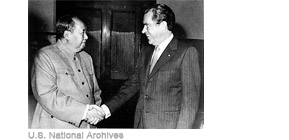The Global Network Initiative (GNI) was founded in October 2008 to help technology firms navigate the political implications of their success. Engineers at the world’s leading technology firms have been incredibly innovative, but do not always the global dynamics of their innovation. Moreover, they do not always acknowledge the ways in which politicians get involved with the design process. The creation of the GNI signaled that some in the technology sector were ready to start having more open conversations. Facebook recently joined the GNI–now four years old–as an “observer”. But the company’s founder Mark Zuckerberg also traveled to Moscow to meet with that country’s tech-savvy second-in-command, Dmitri Medvedev. With the anniversary of the GNI in mind, let’s consider the different ways of interpreting the Zuckerberg-Medvedev summit.
The “Only Nixon Could Go To China” Interpretation
This metaphor is supposed to refer to what happens when someone with good credibility on an issue engages with someone who has little credibility on that issue. For observers, the hope in such a meeting is that the person with credibility will make forceful arguments, represent the strength of international consensus, and even change minds on the other side. So the CEO of the leading social network application must have traveled to Moscow to convince the Russian government that Facebook represented an important information infrastructure for both personal communications and public life. Encouraging Russians to take control of their own social networks–and social capital–could only be good for the country’s economic, cultural and political future. Surrendering the management of social networks and opening up information access to individual internet users might have consequences for the authoritarian regime. But in face-to-face conversation, Medvedev might have come around to the idea that the benefits of a more open public sphere were more important than the risks to his authority.
The Looking for Markets Interpretation
Some observers might interpret the public appearances of Zuckerberg and Medvedev as evidence that the CEO of Facebook was courting new markets. This might have meant promising that Facebook would cooperate with the Russian government’s requests for information on particular users. Or it might have meant that the company had no particular interests in the political fate of the current government. Much of the media coverage of this event takes the angle that Zuckerberg was meeting with Russian elites to help secure market share. Good personal relations might mean that the Russian state would be less likely to block access to Facebook for the Russian user base during a political crisis. It might mean that Russia’s ultra-nationalists are an important new market segment, and posing with Medvedev was about a new branding strategy.
Wither the GNI?
Founded by Microsoft, Yahoo! and Google, the GNI was going to help the tech sector engage in policy conversations, learn from each other’s experiences, and make companies accountable for their behavior. Facebook is an “observer”, but Intel, Cisco, Twitter and Amazon haven’t signed up. The GNI has not attracted many non-US firms. Meanwhile, prominent human rights organizations say the GNI does not high expectations for the conduct of its corporate members. When authoritarian governments ask for digital evidence about the online activities of their citizens, or ask for infrastructural changes that make surveillance a little easier, many firms, much of the time, acquiesce.
Alas, even the GNI’s members have been unable to resist demands from authoritarian governments for censorship or evidence about the democracy activism of technology users. Evidence provided by Yahoo! has led to the imprisonment of democracy activists. Microsoft complied with a request to shut down a blogger. Google censors its own search results for Chinese users, at the behest of the Chinese Party. When the GNI turns 5, let’s see a) how many of the GNI’s own members have been scolded for their behavior, b) how many non-member firms have been scolded for their behavior, and c) how many countries have been scolded for their behavior. Some might want to see much more than scolding, since there only a few examples of how industry-led self-regulation can work. More formal sanctions and rewards might eventually be needed to help encourage the good behavior of Western technology firms and the governments that want to connect to the global information economy.
If, in its fifth year, the GNI has scolded few of its members, other technology firms, or governments, it may be time to greatly simplify the organization’s commandments. One could be “Though shall not tailor software, hardware, standards, code or protocols at the request of particular governments.” Some governments can certainly develop their own information technologies (though only China may be the only one with the resources to regularly do this). But if the GNI is to live much longer and be a global network initiative, the members of this association should value global standards and a global user base, and work towards spreading norms of open internet use globally.
The GNI may be flawed, but its objective of getting tech firms to resist political interference with user-generated content is noble. Watching Zuckerberg go to Russia should remind us all that technology firms are political actors who need some public policy oversight.
Update: I agree the GNI is worth strengthening because its objectives are worthwhile, and Rebecca MacKinnon’s Consent of the Networked documents its successes and challenges. The fact checking errors here are mine: some of the most high-profile examples of industry acquiescence occurred before the GNI was formed, further demonstration of its value.



Isn’t the social network market in Russia already dominated by vkontakte.ru?
Hey there Phil.
There’s always plenty to criticize but I suggest you get your facts straight on three points at least.
Yahoo’s handover of dissident information to Chinese police occurred in 2004, four years before the GNI was launched in 2008.
Microsoft takedown of Chinese blogger content happened in late 2005/early 2006, also well before GNI came into existence.
Google stopped censoring its Chinese search engine in response to Chinese govt demands in 2010.
All three companies have been scolded publicly in spades by GNI’s NGO and academic members for their blunders in China. I am happy to provide you links to my own writings in that regard.
Respectfully
Rebecca
Thou shalt not tailor software, hardware, standards, code or protocols at the request of particular governments
For US firms, does complying with US laws requiring access under subpoena and laws such as the Patriot Act count as “tailor”ing? If so, then it is difficult to see how they can operate at all. If not, then it is difficult to see how to justify the objective. We have seen the other side of the same coin with recent US security concerns regarding Huawei: should Huawei be required to meet different standards in the US/Canada than in China?
All of which is to say that I don’t see a clear way to phrase the GNI objective that is both internationally acceptable and admirable.